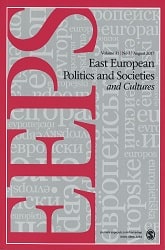A Genealogy of Communist Successor Parties in East-Central Europe and the Determinants of their Success
A Genealogy of Communist Successor Parties in East-Central Europe and the Determinants of their Success
Author(s): Mitchell OrensteinSubject(s): Political history, Government/Political systems, Transformation Period (1990 - 2010), Post-Communist Transformation
Published by: SAGE Publications Ltd
Keywords: East-Central Europe; communist successor parties; electoral success; socialist parties; postcommunist period;
Summary/Abstract: Why have communist successor parties met with such great electoral success in Hungary and Poland, but not in some other countries of East-Central Europe, most notably Slovakia and the Czech Republic? In the area-studies journals, a consensus view has emerged that the victories of the Polish Alliance of the Democratic Left (an alliance of 27 parties and groups led by the Social Democracy of the Republic of Poland, the communist successor party) and the Hungarian Socialist Party in 1993 and 1 994 represented a reaction against previous government policies. Voters rejected Solidarity and the Hungarian Democratic Forum (MDF) because they were disenchanted with the effects of neoliberal economic reform and with the cultural conservatism of center-right parties on issues like abortion, religion, xenophobia, and foreign affairs. [...]
Journal: East European Politics and Societies
- Issue Year: 12/1998
- Issue No: 03
- Page Range: 472-499
- Page Count: 28
- Language: English
- Content File-PDF

